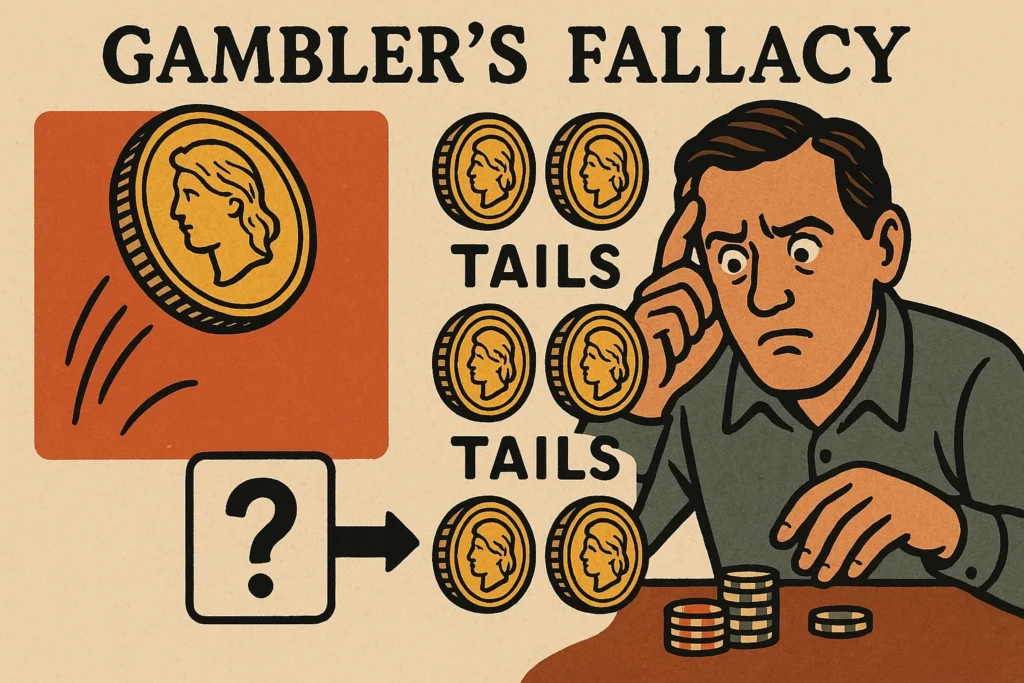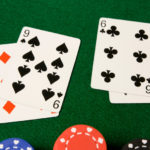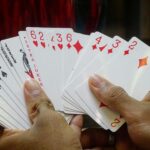Table of Contents

Be honest with me: Ever catch yourself waiting for a win just because you had a long enough losing streak?
Classic Gambler’s Fallacy. And trust me, you’re not the only one. Lots of players think a game owes them a win after a dry spell. Spoiler alert: It doesn’t.
Let’s see why our brain loves this trick, how Gambler’s Fallacy messes with our bets, and why understanding all this can help you play smarter.
How to keep your gaming habits in check without falling for the trap? You’re all sorted.
Ever Heard of Gambler’s Fallacy?
It’s just a fancy way to describe that feeling when you think a casino game is “due” for a win just because it hasn’t paid in a while.
It also goes for any other situation when you think past results can somehow affect future outcomes. Say, you might think red is about to hit in online roulette after a long streak of blacks (another spoiler: it doesn’t work this way).
Want me to be clearer? Think of coin flipping. If you flipped 6 heads in a row, it doesn’t mean tails is “due”. Every single flip is random and independent. Same goes for games of chance.
Why Our Brains Do This
Thing is that in slots, roulette, or whatever game of pure chance – each deal, spin, or roll is absolutely independent. But our brain likes to see patterns, even when there aren’t any.
Now, the randomness in casino games ain’t intuitive, but players are wired to expect balance. If it’s been mostly red in roulette, black kinda feels overdue, right? But you know what – the wheel doesn’t care. And understanding this is gold.
Quick reality check: Random doesn’t mean fair, and those long cold or hot streaks are just streaks. Your brain is simply wired to trick you.
Classic “It’s Due” Moments at the Casino
Oh, we’ve all been there. Don’t even try to convince me otherwise.
Say, you’re on a long, cold streak and your slot hasn’t paid out a penny for hours, you might suddenly think, “Right, so it’s gotta hit any time now.” Classic “hope meets superstition” moment.
Or, say, you’ve been racking up losses in roulette or blackjack. Doesn’t every next spin or flip feel like it’s your lucky one? You wish, but every next move is independent, remember that.
Then there’s the one with “hot” machines. Spotted a slot machine that’s been spitting out wins left and right, and now everyone thinks it’s the highest-paying on the block? People swapping stories like this is enough to back up something that ain’t possible.
I mean, who doesn’t like a bit of a social moment?
Ah, and dice roll? Nothing says “it’s due” like a pair of rolling cubes. Players give the dice a shake, thinking they’ll be lucky. Meanwhile dice… do their thing, laughing at the whole thing.
Now, look, guys. This “it’s due” is 110% normal. Nothing to be ashamed of. Honestly? They’re part of the fun. Just don’t fall into chasing that feeling.
My take? Treat all this like a fun casino moment, not a strategy. If anything, don’t let superstition run the show.
The Math Behind Gambler’s Fallacy
No, we ain’t speaking numbers. Chill. It’s just a way to show you that all those Gambler’s Fallacy moments are just in your head, while math says no.
There’s such a term as “probability”. So, every time you play a fair game (roulette, slots, you call it), this probability resets. So, if you lose ten times straight, does it mean the wheel will care enough to award you with a win? Nope, you could as well lose again.
Let the figures speak: landing on red in (European) roulette has a roughly 48.6% chance every single spin. Even so, every spin is independent.
Funnily enough, I came across this post on Reddit with a player saying he hit red 10 times in a row before betting on black. And guess what? It hit red two more times.
The simplest example is the same coin flip with a 50/50 probability, and you still don’t know which one will win. Facts are facts, and you can’t do anything about them.
Something to remember: One result doesn’t affect another. Probability plays it steady. And thinking “it’s due” has no proven backup.
Why “It’s Due” Is The Fastest Way to Lose Your Cash
Despite knowing about Gambler’s Fallacy, we still keep thinking that doubling down after a losing streak, for instance, means the casino game owes us a win. Problem is – math couldn’t care less. But your wallet? Oh, it will do.
The kicker is that the more you chase those crazy ideas, the quicker your funds will vanish. Sure, a few fast wins might give you the thrills, but trust your guy here, those losses almost always catch up.
Smartest way is to stop. Or, even better, set a budget in advance and stick to it no matter what (it’s always easier to use the casino’s built-in responsible gambling tools – limits included).
How to Outsmart Your Own Brain
Or, how to dodge the Gambler’s Fallacy?
Here’s how:
- Track your bets, spins, and results objectively instead of thinking someone owes you something.
- Set hard limits (max loss and session length) before you even think of playing.
- Pause between rounds to avoid impulse betting.
- Focus on fun, not payouts (either way, the outcome will be the same, so no need to stress over it).
- Use casino tech wisely to track your sessions and receive loss alerts (to keep you alert).
Bottom Line?
To wrap things up – Gambler’s Fallacy is real, but you decide to trust it or not (heads-up: don’t). If anything, luck has never followed patterns in games. Trying to outsmart randomness is impossible, but you can outsmart this tricky mindset that a win “is due”.
Instead of losing time on impossible systems like this, better use this time to understand odds and manage your budget. Stay logical, guys. This way, you’ll have more fun and risk less.
Takeaway for ya: Don’t ever treat games as income. Randomness will never owe you a favour. So, stay within your limits and keep it fun, as it should be.
- 10 Secrets Casinos Don’t Want You to Know - December 11, 2025
- Casino Withdrawal Fees in the UK - December 1, 2025
- Online Gambling as a Full-Time Job – Is It Possible? - November 10, 2025










